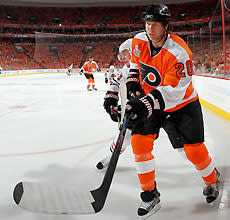Like him or hate him, Flyers' Pronger leads ’em
PHILADELPHIA – After their series-saving overtime win Wednesday night, the Flyers spoke in their locker room about nerves. Ville Leino(notes): "It was a little scary to be on the bench." Scott Hartnell(notes): "It was a little bit of an emotional roller coaster." Kimmo Timonen(notes): "It was tough. You start getting the emotions."
So, Chris Pronger(notes), how nervous was the team?
"I don't think we were nervous at all."
And that's the genius of Pronger's game. He's not nervous at all. When he's on the bench, it seems like he's sitting alone, a mountain surrounded by hills. When he's on the ice, his stick is like the sweeping wand of a radar screen, detecting trouble long before it arrives, so that he's prepared and everyone is safe.
When the Flyers lost their early 1-0 lead to the Chicago Blackhawks and the crowd noise evaporated, Pronger assisted on Hartnell's go-ahead goal. When the Flyers went down 3-2 early in the third on a breakaway goal by Patrick Kane(notes), Pronger was on the ice for the almost-immediate tying goal. When his teammates blew an icing with seconds left in regulation, Pronger happened to be stationed in the crease, easily able to swat the loose puck away. It was Pronger who set up the potential game-winner in overtime that was disallowed, and it was Pronger who was standing guard when Claude Giroux(notes) made this a series again with a 4-3 overtime victory. Pronger had the highest plus-minus on his team in Game 3 (plus-2) even though he was on the ice more than any other player (32:07).
So how does he do it? Pronger doesn't so much skate as loom. He monitors. He patrols. He makes sure. His scuffles, though fairly frequent, don't seem angry. They seem perfunctory – as if he decided to shove a particular opponent before he left the bench. He decks a Patrick Kane or a Jonathan Toews(notes) just to let them know he's there. He spars with Dustin Byfuglien(notes). He pins Marian Hossa(notes) against the boards. This takes tons of strength, of course, but Pronger doesn't get tired.
That's because he doesn't waste time or effort. He decides when to enter the fray and when to leave it. He carves out entire chunks of ice to stand on, and everyone seems to leave him the hell alone, as if he's radioactive.
And he is. His preternatural calm makes opponents anxious – even from afar. He's the cop on the beat, almost blending into the background, watching for any false moves, ready to aim and fire if necessary. The 'Hawks know Pronger doesn't make mistakes like he may have as a younger player. They know he's temperamental – even if that's part act. And they know he's a brilliant passer. When a Chicago player approaches him, that means he's not approaching someone else, and Pronger finds that someone else, no matter where he is.
That's important. The new NHL rules would seem to hurt someone like Pronger, who plods and roams. Not so. The rules help Pronger, because they allow him to rip headman passes farther, when everyone is watching him and no one is watching the play develop down the ice. Notice all three of Pronger's visits to the Stanley Cup Finals have come after the lockout – Edmonton in '06, Anaheim in '07 and now Philadelphia. Not bad for a 35-year-old in the new era of wide-open hockey. Truth is, playoff hockey is only wide open for Pronger, who stretches the ice with his size, with his reputation, with his smarts and with his passing. Pronger is both a throwback and a visionary.
And now he's holding his team up almost by himself. He's the one giving the media something to write about and giving the series-leading Blackhawks something to think about. He threw the game pucks in the trash in Chicago, which is punkish if you're a Chicagoan but hilarious if you're from Philly. That's the point. During interviews, he'll alternately scowl and grin, flashing the gap between his front teeth. He's a bully and a brat. But he's always in control.
"There's a lot of talk coming from their side," Pronger said. "We're just trying to play our game." That line tweaks the 'Hawks, delights the press and allows the Flyers to … play their game.
The Flyers gave credit to their coach, Peter Laviolette, for telling them before overtime to keep up the attack. Pronger said the same thing: "In overtime, you can't sit back. You gotta continue to press." But Pronger did not press in overtime. He didn't change anything. And that allowed his teammates to continue to press. So what if they were scared? They could afford to be.
Asked in the locker room if he thought Pronger was nervous in overtime, Leino did a double take.
"Nervous?" he said. "Ha. No."
Exactly.


